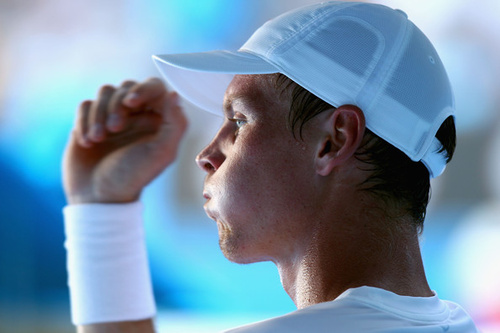Don't miss any stories → Follow Tennis View
FollowTomas Berdych Aims to Avoid Career Czechmate
For the seventh-ranked player in the world, the margins between painful defeat and glorious victory are slim. But it is these margins that Czech Tomas Berdych cannot yet seem to negotiate. A player who has appeared consistently in the world’s top 10 for the past three years, Berdych’s mental strength at crucial moments and his general likability seem to be the only obstacles that he must overcome to vault from enigmatic also-ran to respected champion. Heading into the Davis Cup Final this week, Berdych will feel that he will be able to challenge Novak Djokovic and his Serbian teammates. But, while his consistency signals that he may belong in the world’s top 10, his failure to record any career-defining tournament wins detracts from his credentials to be able to challenge Novak in this week’s Davis Cup tie and other players in the top five moving forward.

Most lists of the men’s top 10 in the past 30 or 40 years have incldued “that” player. The player who, despite consistently ranking within the top 10 and registering major semifinal and final appearances, failed to convert their potential to a major title. These have ranged from Marcelo Rios in the late 1980s, to Magnus Norman, Todd Martin and Tim Henman in the 1990s to Guillermo Coria and Fernando Gonzalez in the 2000s.
Just what the 28-year-old Czech needs to do to take the last step in fulfilling his potential is hard to pinpoint, but there are parts of his game that perhaps need refining. Mental resilience on key points is a part of Berdych’s game that arguably needs to be adjusted. Anyone who is anyone in the tennis world knows that the ATP circuit is tough, which means that a player must be even tougher to reach the peak of the ATP hierarchy.
The difference between a loss and a win against opponents in the top 10 often can be decided by one point that sometimes does not look as important at the time as it does in retrospect. An example comes from Andy Murray’s five-set comeback against Fernando Verdasco at Wimbledon this year. The pressure on Murray was palpable as he looked to be the first British male to win Wimbledon in 77 years. There was one particular point in the second set where Verdasco was serving to take a two-set lead, having completely outplayed Murray until that stage. The second point of that game produced a rally in which Verdasco pinned Murray into a defensive position by blasting groundstrokes mercilessly. After 26 strokes, Verdasco came in behind a low slice backhand crosscourt, and Murray tracked it down to hit a stunning forehand crosscourt for an improbable winner. Although the Scot would lose that set, it seemed to be the rally that sparked his eventual comeback and perhaps planted a seed of doubt in the underdog’s mind.
Until now, Berdych has failed to show that he has the mental strength to produce mentally resilient tennis and unnerve his opponents at moments like those. In his maiden grand slam final at Wimbledon against Rafael Nadal in 2010, Berdych stayed even until the seventh game of the first set when he was broken by the Spaniard through a few benign forehands and went on to lose the first set. Once again in the second set, he could not produce his trademark solid tennis and lost the set with a number of poor shot selections. Those were the types of poor decisions that can cost a player a major final. Berdych surely suffered from nerves in that situation, but the overcoming of these nerves is what inherently turns the good players into the great.
It is difficult to simulate situations of such extreme pressure in order to overcome them, but an issue that Berdych can address more directly is his likability on the circuit. While it is no secret that most of the players in the men’s top 10 are respectful colleagues, Tomas Berdych seems to command the “bad boy” tag of the world’s elite and awakens animosity more often than most. There is no doubting Berdych’s fiercely competitive streak, yet his tendency to overreact and handle himself poorly in certain moments sometimes estranges him from his opponent and his crowd.
Berdych’s chronic hostility toward opponents, as well as his streak of disdain for media and fans, first flared during the Masters 1000 event in Madrid in 2006 when he beat a young Nadal in straight sets. In celebration, the then-20th-ranked Berdych placed his finger in front of his mouth to tell the Madrid crowd to be quiet. To no surprise, this gesture received an extremely poor reaction from the Spanish crowd. In his post-match press conference, the normally taciturn Nadal labeled Berdych a “bad person” and “stupid.”
The hostility in their relationship arose again four years later, when Berdych spoke against Nadal having what he perceived as a longer conversation with the umpire over a line call than what should be tolerated. At that post-match press conference, Berdych said that the umpire “is probably scared of him (Nadal) and allowed him to talk too much.”

In 2012, Berdych’s apparent dislike for Nadal widened to encompass another Spaniard in Nicolas Almagro at the Australian Open. Berdych had approached the net behind a drop shot during a tense stage in the match, and Almagro fired a forehand passing shot toward Berdych, who then fell to the ground. Almagro duly apologized, but Berdych still refused to shake Almagro’s hand after the Czech served out the match. Not only was this (lack of a) gesture poorly received by Almagro, but audiences at the arena and around the world reacted with distaste.
Like him or loathe him, there is no doubt that Berdych possesses an incredibly solid game and an exceedingly tough competitive instinct. But he must learn to channel that toughness into a productive rather than self-defeating form. Time remains for Berdych to refine the small but important aspects of his game, and anyone in the tennis world would be foolhardy to dismiss his chances at next year’s majors. But with world-dominating players like Nadal, Djokovic and Murray all aged between 26 and 27, time is growing shorter and shorter for Berdych and the margins for error even smaller










